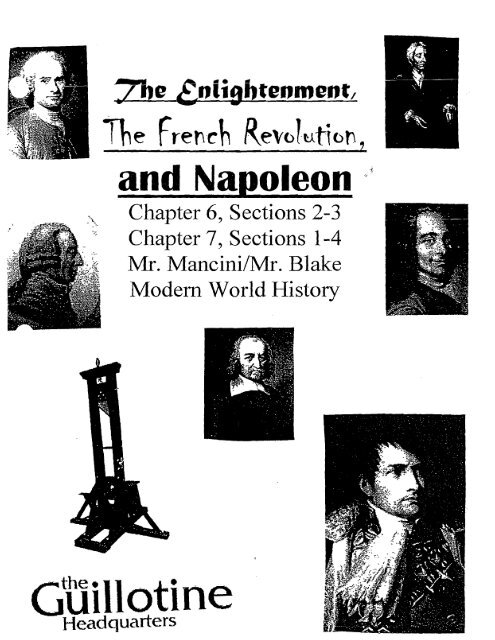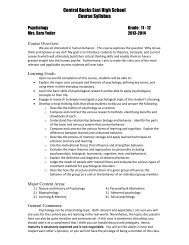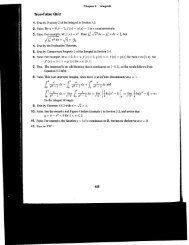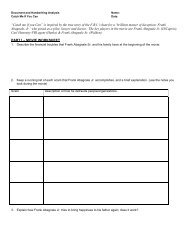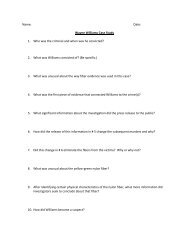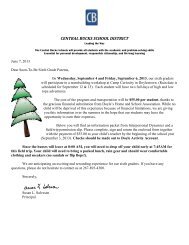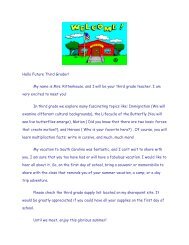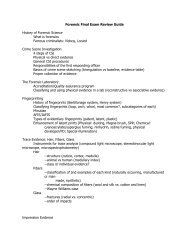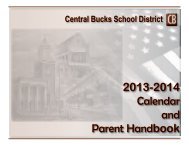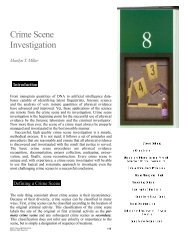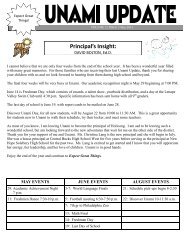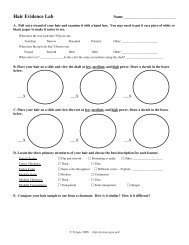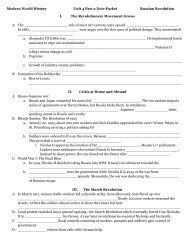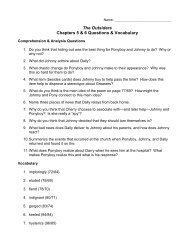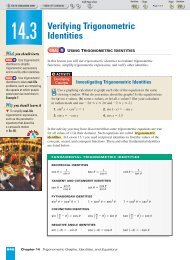French Revolution and Napoleon.pdf
French Revolution and Napoleon.pdf
French Revolution and Napoleon.pdf
Create successful ePaper yourself
Turn your PDF publications into a flip-book with our unique Google optimized e-Paper software.
-<br />
<strong>and</strong> <strong>Napoleon</strong> r<br />
Headquarters<br />
Chapter 6, Sections<br />
I ,<br />
Chapter 7, Sections<br />
Mr. Ma] cnMr B1<br />
Modem World Hist<br />
q
Name -<br />
e<br />
Date<br />
GUIDED READING The Enlightenment in Europe<br />
Section 2<br />
A. Recognizing Facts <strong>and</strong> Details As you read this section, fill in the diagram by<br />
describing the beliefs of Enlightenment thinkers <strong>and</strong> writers.<br />
/<br />
1. Voltaire<br />
Enlightenment Philosophers <strong>and</strong> Writers<br />
f 4. Cesare Bonesana Beccaria \ 5. Mary Wollstonecraft<br />
B. Drawing Conclusions How did Enlightenment thinkers <strong>and</strong> writers set the<br />
stage for revolutionary movements?<br />
C. Perceiving Relationships On the back of this paper, write a paragraph contrasting<br />
rThomas Hobbes's social contract view of government with the political philosophy<br />
of John Locke.<br />
20 UNIT 2, CHAPTER 6
Enlightenment Thinkers:<br />
Analyzing a Quotation:<br />
this is taken quotation from John Locke<br />
"Tyranny is the exercise of power beyond right, which nobody can<br />
have a right to . . . whosoever in authority exceeds the power given him<br />
by the law <strong>and</strong> makes use of the force he has under his comm<strong>and</strong>. . .<br />
may be opposed."<br />
Explain this quotation in your own words <strong>and</strong> then state whether<br />
you think the idea expressed by quotation still applies today.<br />
Voltaire once said in response to the efforts of governments <strong>and</strong> Church<br />
authorities to censor books:<br />
"I know many books which have bored their readers, but I know of<br />
none which has done real evil . . . Does a book displease you? Refute it?<br />
Does it bore you, do not read it"<br />
Do you agree or disagree with Voltaire's assertion that a book can do<br />
no evil. Do you believe schools have the right to censor book put in the<br />
library? Should government be allowed to censor web sites?
Name<br />
$Class Cvitical Thinking Wovksheet<br />
I-<br />
Date<br />
-<br />
Topic: Enlightenment Philosophers<br />
Skill: Making inferences<br />
During the Age of Enlightenment, writers expressed a concern for the welfare of society as a whole.<br />
They advocated liberty <strong>and</strong> reason as key to happiness <strong>and</strong> progress. These ideas were applied to many<br />
fields of endeavor including philosophy, politics, <strong>and</strong> economics. Study the following quotations from<br />
writers of the Enlightenment. Then make inferences to answer the questions that follow.<br />
(a) Liberty of thought is the life of the soul.<br />
Voltaire<br />
[b) Liberty is obedience to the law which one has laid down for oneself.<br />
lean-jacques Rousseau<br />
(c) If 1 knew of something that could serve my nation but would ruin another, I would not propose it<br />
to my prince, for I am first a man <strong>and</strong> only then a <strong>French</strong>man . . . because I am necessarily a man,<br />
only accident$ am i <strong>French</strong>.<br />
Montesquieu<br />
(d) Wherever Law ends, Tyranny begins.<br />
John Locke<br />
[e) All systems elther of preference or of restraint . . . being thus completely taken away, the obvious<br />
<strong>and</strong> simple system of natural llberty establishes itself of its own accord. Every man, as long as he<br />
does not vlolate the laws of justice, is left perfectly free to pursue his own interest his own<br />
way.. .<br />
Adam Smith<br />
If) Liberty 1s the nght to do whatever the laws permit.<br />
Mon tesqureu<br />
1. How do each of the following view the concept of liberty?<br />
(a) Voltaire<br />
(b) Smith<br />
(c) Montesquieu<br />
2. How do each of the following view the concept of law?<br />
(a) Rousseau<br />
(b] Locke<br />
3. What importance does Montesquieu give to nationalism?<br />
4. What is the relationship between law <strong>and</strong> liberty according to<br />
(a) Rousseau?<br />
(b) Locke?<br />
(c) Montesquieu?<br />
0 D.C. Heath <strong>and</strong> Company
Name Date<br />
pn!xAny soupce frnm Th,e So&l Co~,t~ct<br />
J- ----<br />
by Jean-Jacques Rousseau<br />
Section 2 In The Social Contract, published in 1762, the philosoph+-a writer during the<br />
18th century <strong>French</strong> Enlightenment-Jean-Jacques Rousseau outlined his ideas<br />
about individual freedom <strong>and</strong> obedience to authority. As you read this excerpt,<br />
think about Rousseau's argument against the use of force as a means of governing<br />
the people.<br />
m. ,L. : - . r . ?, : - .-,., ,-- .-.-I < : . .<br />
* ~ ~ ~ - g = + z ' L ~ ~<br />
Chapter I-Subject of the<br />
First Book<br />
Man is born free; <strong>and</strong> everywhere he IS In chains.<br />
One thinks himself the master of others, <strong>and</strong> still<br />
remains a greater slave than they. How d ~d this<br />
change come about? I do not know What can make<br />
it legitimate? That question I think I can answer.<br />
If I took into account only force, <strong>and</strong> the effects<br />
derived from it, I should say: "As long as a people IS<br />
compelled to obey, <strong>and</strong> obeys, it does well; as soon<br />
as it can shake off the yoke, <strong>and</strong> shakes it off, it<br />
does still better; for, regaining its liberty by the<br />
same right as took it away, either it IS justified in<br />
resuming it or there was no justification for those<br />
who took it away." But the social order is a sacred<br />
right which is the basis of all rights. Nevertheless,<br />
this right does not come from nature, <strong>and</strong> must<br />
therefore be founded on oonvenhons Before coming to<br />
that, I have to prove what I have just asserted.<br />
Chapter HI-The Riglzt of the<br />
Strongest<br />
The strongest IS never strong enough to be<br />
always the master, unless he transforms strength<br />
w into right, <strong>and</strong> obedience Into duty Hence the right<br />
al<br />
> & of the strongest, which, though to all seeming meant<br />
al Lo<br />
ironically, is really laid down as a fundamental prin-<br />
&<br />
V)<br />
E ciple. But are we never to have an explanation of<br />
- 0,<br />
& - this phrase? Force is a physical power, <strong>and</strong> I fa1 to<br />
a see what moral effect it can have. To yield to force<br />
ti<br />
- C<br />
- is an act of necessity, not of w11-at the most, an<br />
- Q)<br />
a= act of prudence. In what sense can it be a duty?<br />
17 -<br />
Suppose for a moment that thls so-called "nght"<br />
a<br />
0,<br />
3 exists. I maintain that the sole result is a mass of<br />
0<br />
inexplicable nonsense. For, if force creates nght,<br />
P the effect changes with the cause: every force that<br />
0<br />
is greater than the first succeeds to its right As<br />
soon as it is possible to disobey with impunity, dis-<br />
- -,. ., .. . . - , . . :.. . . . . . . .. .. , . - u=<br />
obedience is legitimate; <strong>and</strong>, the strongest being<br />
always in the right, the only thing that matters is to<br />
act so as to become the strongest. But what kind of<br />
right is that which perishes when force fails? If we<br />
must obey perforce, there is no need to obey<br />
because we ought, <strong>and</strong> if we Ire not forced to obey,<br />
we are under no obligation to do so. Clearly, the<br />
word "right" adds nothing to force: in this connec-<br />
tlon, it means absolutely nothing<br />
Obey the powers that be. If this means yield to<br />
force, ~t is a good precept, but superfluous: I can<br />
answer for its never being violated. All power comes<br />
from God, I admlt, but so does all sickness: does that<br />
mean that we are forbidden to call in the doctor? A<br />
brig<strong>and</strong> [b<strong>and</strong>t] surprises me at the edge of a wood:<br />
must I not merely surrender my purse on compul-<br />
sion, but, even if I could withhold it, am I in con-<br />
science bound to give it up? For certainly the pistol<br />
he holds is also a power.<br />
Let us then admlt that force does not create<br />
nght, <strong>and</strong> that we are obliged to obey only legitimate<br />
powers In that case, my original question recurs.<br />
from Jean-Jacques Rousseau, The Sonal Contract <strong>and</strong><br />
Dtswumes <strong>and</strong> Other Essays, trans. by C.D H Cole (E P<br />
Dutton & Company, Inc , 1950). Repnnted In Peter Cay,<br />
ed , The Enlightenment A Cornprehenstw Anthology (New<br />
York. Slmon <strong>and</strong> Schuster, 1973). 322325<br />
Discussion Questions<br />
Recognizing Facts <strong>and</strong> Details<br />
1. Which did Rousseau belleve was better-a gov-<br />
ernment freely formed by the people or one<br />
imposed on a people by force?<br />
2 Did Rousseau believe that lt was the right of the<br />
strongest to rule?<br />
3. hlaking Inferences How would you compare<br />
Locke's ideas about government with Rousseau's?
Name Date<br />
@<br />
.- - HlsroRvMnKE~s Baron de Montesauieu<br />
Section 2<br />
I<br />
Writing the Science of Government<br />
"It is necessary by the arrangement of things, power checks power."-<br />
Montesquieu, On the Spirit of Laws (1748)<br />
harles-huis de Secondat, the Baron de<br />
C tvlontesquieu, studled politics throughout his<br />
life <strong>and</strong> wrote a huge <strong>and</strong> exhaustive study of government<br />
One of his key views was that authority<br />
should be divided. This idea became popular in<br />
Engl<strong>and</strong>'s North American colonies<br />
In 1689, Montesquieu was born near Bordeaux,<br />
France. His family had long served in the military<br />
<strong>and</strong> had good soclai position. He married a weaithy<br />
woman who had a good head for business-so good<br />
that he often let her run the family estates. When<br />
his uncle cted, he became Baron de Montesquieu<br />
at age 27 <strong>and</strong> began serving as a judge.<br />
Montesquleu soon became famous as a writer.<br />
The Perstan Letters appeared in 1721 without identifying<br />
him as the author. The book was supposedly<br />
written by two Persian travelers who visited France<br />
<strong>and</strong> wrote letters to describe what they saw. In this<br />
way, Montesquieu was free to criticize <strong>and</strong> poke<br />
fun at <strong>French</strong> society. The king, he wrote, was a<br />
trickster who "makes people kill one another even<br />
when they have no quarrel " The pope he called a<br />
"conjuror," or magician. Later, Montesquleu was<br />
revealed as the author<br />
Now well-known, Montesquieu moved to Paris<br />
<strong>and</strong> joined In the luxurious court life there. As a<br />
result, his fortune dwindled. The combination of<br />
u financial need <strong>and</strong> boredom led him to sell his<br />
w<br />
2 judgeship He used the money to take a long tour<br />
w ul<br />
L of Europe. He explored art <strong>and</strong> science <strong>and</strong> met<br />
U)<br />
E leadlng politicians <strong>and</strong> writers. He also stayed many<br />
.- 0,<br />
L. - months In Engl<strong>and</strong> studying its government.<br />
;5 Upon returning to France, Montesquieu spent<br />
0<br />
- C<br />
-<br />
two years writing a book on the English constitu-<br />
- w<br />
-- r: tion. Then he decided to write a detalled study of<br />
-1 - government. For years he worked dihgently, using<br />
a<br />
0,<br />
3 as many as six people at a time taking notes In<br />
0<br />
1748, after 17 years of reading, wribng, <strong>and</strong> revis-<br />
P ing, he published On the Spirit of Laws It filIed<br />
0<br />
more than 1,000 pages <strong>and</strong> broke new ground<br />
Montesquieu attempted to make a science of<br />
government. His work reflected Enlightenment<br />
ideas that people, using their minds, could under-<br />
st<strong>and</strong> the world around them However, he was not<br />
a rahcal who urged rule by the people instead of by<br />
kings. He was deeply conservative <strong>and</strong> hoped to<br />
maintain the privileged position of the aristocracy.<br />
He believed that the king's power was dangerous<br />
but thought that a strong aristocracy could check<br />
that authority. He admired Engl<strong>and</strong> because the<br />
strength of its nobles limited the control of the king<br />
~ontesquieu aiso saw human nature as the<br />
same around the world. However, he thought that<br />
laws <strong>and</strong> government depended on many factors,<br />
including relipon, geography, <strong>and</strong> climate. Good<br />
government requires shaping laws to suit local conditions.<br />
He thought it was easier for people to enjoy<br />
liberty in a mountainous country like Switzerl<strong>and</strong> or<br />
an isl<strong>and</strong> like Engl<strong>and</strong>. Isl<strong>and</strong>s protect people from<br />
attack by other countries. Harsh conditions in the<br />
mountains, he believed, lead people to have a spir~t<br />
of individualism that promotes liberty.<br />
Montesquieu wanted to make sure that no part<br />
of the government grew too strong The best way to<br />
preserve freedom, he said, was to dlvide authority<br />
The ability to make laws, to carry out laws, <strong>and</strong> to<br />
judge laws should rest in different branches of<br />
power.<br />
This idea was adopted in the United States<br />
when the Constitution was written. Thus, his ldeas<br />
took hold in a country with traits similar to those of<br />
Engl<strong>and</strong> <strong>and</strong> ~itzerl<strong>and</strong>. Separated from Europe<br />
by a vast ocean, the United States was safe from<br />
attack. In their rugged l<strong>and</strong>scape, the American<br />
people developed a strong sense of individualisin.<br />
Questions<br />
1. Recognizing Facts <strong>and</strong> Details How did<br />
Montesqu~eu's circumstances allow him to spend<br />
his life writing?<br />
2. Drawing Conclusions Why did Montesquieu<br />
think that it was a good idea to have different<br />
powers checking each other?<br />
3 Perceiving Relationships How &d<br />
Montesquieu differ from other writers of the<br />
Enlightenment?<br />
Enlightenment <strong>and</strong> <strong>Revolution</strong> 35
Name Date<br />
0 GUlDED READING The Spread of<br />
Section 3<br />
Enlightenment Ideas<br />
A. Draming Concltcsions As you read about art, literature, <strong>and</strong> politics in the Age of<br />
Reason, explain how each of the following people reflected Enlightenment ideas.<br />
1. Denis Diderot<br />
I 2. Franz Joseph Haydn<br />
1<br />
3. Wolfgang Amadeus Mozart 1<br />
4. Ludwig van Beethoven i5. Samuel Richardson<br />
l----T-<br />
B. Using Context Clues On the back of this paper, define the following terms:<br />
salon baroque neoclassical enlightened despot<br />
Enlightenment <strong>and</strong> <strong>Revolution</strong> 21
USIEiG<br />
HISTORICAL<br />
SOURCES Name Daie<br />
-. - .<br />
1 7 Chapter P. Vindlcziicr. af the Rights -,f '?vA=~~en<br />
The question of women's rghts was raised in the reform envtronment of the Enli,ahtenment.<br />
One of the most important early feminist documents is lLIary Wollstonecraft's A Vindication<br />
of the Rights of Woman, completed in 1792 A brilliant <strong>and</strong> talented woman, Mary<br />
Wol/stonecraft Codwin (1 759-1 797) posed questions that are st111 discussed today Read the<br />
excerpt below <strong>and</strong> answer the questions that follow.<br />
Men complain, <strong>and</strong> with reason, of the follies<br />
<strong>and</strong> caprices of our sex.. . . Behold. I should<br />
answer, the natural effect of ignorance!. . .<br />
Women are told from their infancy, <strong>and</strong> taught by<br />
the evampte of their mothers, that a little knowl-<br />
edge of human weakness, justly termed cunning.<br />
softness of temper, outward obedience, <strong>and</strong> . . .<br />
propriety, will obtain for them the protection of<br />
man; arid should they be beautiful, everything<br />
else is needless, for, at least, twenty years of their<br />
lives. . . .<br />
Though moralists have agreed that the tenor of<br />
life seems to prove that man is prepared by vari-<br />
ous circumstances for a future state, they con-<br />
stantly concur In advising woman only to provide<br />
for the present Gentleness, docility, <strong>and</strong> a<br />
spaniel-like affection are, on this ground, consis-<br />
tently recommended as the cardinal virtues of the<br />
sex; <strong>and</strong> . . . one writer has declared that it is mas-<br />
culine for a woman to be melancholy. She was<br />
created to be the toy of man, his rattle, <strong>and</strong> it<br />
must jingle in his ears whenever.. . he chooses<br />
to be amused.<br />
How many women thus waste life away. . . who<br />
might have practiced as physicians, regulated a<br />
farm, managed a shop, <strong>and</strong> stood erect, support-<br />
ed by their own industry, instead of hanging their<br />
heads.. . . How much more respectable is the<br />
Vocabulary Use a dictionary to find the meanings of the following words:<br />
vindication<br />
caprice<br />
propriety<br />
concur<br />
docility<br />
melancholy<br />
woman who earns her own bread by fulfilling her<br />
duty than the most accomplished beauty! Yet the<br />
few employments open to women are menial.. . .<br />
Women have seldom sufficient serious employment<br />
to silence their feelings; a round of little<br />
cares, or vain pursuits frittering away all strength<br />
of mind <strong>and</strong> organs, they become natural!y only<br />
objects of sense. In short, the whole tenor of<br />
female education (the education o[ society) tends<br />
to render the best disposed romantic <strong>and</strong> inconstant;<br />
<strong>and</strong> the remainder vain <strong>and</strong> mean. . . .<br />
With respect to virtue, to use the word in a<br />
comprehensive sense, 1 have seen most in low<br />
life. Many poor women maintain the~r children by<br />
the sweat of their brow, <strong>and</strong> keep together families<br />
that the vices of the fathers would have scattered<br />
abroad; but gentlewomen are too indolent<br />
to be actively virtuous, <strong>and</strong> are softened rather<br />
than refined by civilization. Indeed, the good<br />
sense which I have met with among the poor<br />
women who have had few advantages of education.<br />
<strong>and</strong> yet have acted heroically, strongly confirmed<br />
me in the opinion that trifling employments<br />
have rendered woman a trifler.<br />
Adapted from A Vindrcatlon of the Rlghn of Woman by Mary<br />
Wollstonecraft. -<br />
O Prent~ce-Hall, Inc. Using h'1storica1 Sources 1 7 1 7-1 1
iritter<br />
indolent<br />
Comprehension<br />
1. According to Wollstonecraft, what are women told from their infancy?<br />
- -<br />
2. While men are prepared for the future, what does the author say women are advised to provide for?<br />
3. Why, according to Wollstonecraft, is it "masculine for a woman to be melancholy"?<br />
4. What does she say keeps women from working at meaningful jobs? What results from this fact?<br />
Critical Thinking<br />
1. In the first paragraph, Wollstonecraft writes the "outward obedience" helps women to win the protec-<br />
tion of men. What can you infer from her emphasis on oufward?<br />
2. What can you conclude about Wollstonecraft's attitude toward feminine beauty?<br />
- - - --<br />
3. From your reading of previous chapters <strong>and</strong> Chapter 17, describe what influence the Enlightenment<br />
probably had on Wollstonecraft's views.<br />
4. From her comments, espec~ally in the last paragraph, what can you infer that Wollstonecraft thought<br />
were the effects on women of education <strong>and</strong> civilization?<br />
5. In your opinion, which issues that Wollstonecraft raises are still important today?<br />
17-1 2 Usrng tiist~r~~al Sources 1 7 - O Prentice-Hall. Inc
I I<br />
Name<br />
Independent Practice Worksheet 2 O .2<br />
Class<br />
Date Writers advocated liberty <strong>and</strong> reason.<br />
ACROSS DOWN<br />
2. Wrote On the Spirit of Laws 1. Rousseau's best-known book on government<br />
(3 words)<br />
4. Division of power into three branches (3<br />
words) 3. Wrote The Wealth of Nations<br />
5. The kind of trade Adam Smith favored 4. What Adam Smith believed that people work<br />
for (2 words]<br />
7-. The krnds of power lawmakers hold<br />
6. What a good society allows, according -to the<br />
10. The kind of power a ruler <strong>and</strong> his or her philosophes<br />
advisors hold<br />
8. It <strong>and</strong> quantlty available determine price.<br />
13. Declared, "Man is born free, yet everywhere<br />
he is in chains" 9. The kind of power judges hold<br />
14. It <strong>and</strong> dem<strong>and</strong> determine price. 1 I. One who believes in laissez faire<br />
12. According to Rousseau, it <strong>and</strong> liberty exist in<br />
the state of nature.<br />
76 0 D.C. Heath <strong>and</strong> Company.
c<br />
m<br />
e<br />
0<br />
-0<br />
c<br />
m<br />
5<br />
m<br />
I<br />
0'<br />
d<br />
E<br />
.-<br />
0)<br />
L<br />
).<br />
a<br />
0<br />
0<br />
Chapter Graphic Organizer<br />
I<br />
France's Old Regime gives little power to majority (Third Estate).<br />
- -<br />
1789: Third Estate votes to create National Assembly<br />
<strong>and</strong> end absolute monarchy.<br />
1789: Parisian mob storms Bastille to obtain gunpowder.<br />
1791 : National Assembly creates new constitution.<br />
1792: King is formally deposed; France declares war on Austria;<br />
National Assembly is replaced by National Convention.<br />
1793-1 794: National Convention turns radical; king is executed;<br />
Robespierre becomes virtual dictator <strong>and</strong> rules through terror.<br />
seizes power in France, becoming emperor.<br />
1805-1812: <strong>Napoleon</strong> builds vast European empire.<br />
1812-181 5: <strong>Napoleon</strong> invades Russia, is defeated <strong>and</strong> exiled,<br />
World History: Perspectives on the Past<br />
i<br />
.?<br />
1<br />
t<br />
J I<br />
I<br />
21
Name<br />
Class Independent Pvactice Wovhsheet<br />
Date<br />
The <strong>French</strong> monarchy faced a crisis.<br />
I. Indicate the estate to which an individual who engaged in each of the following vocations would<br />
most likely have belonged.<br />
A. First Estate B. Second Estate C. Third Estate<br />
1. Lawyer<br />
- 2. Abbot<br />
- 3. Government officeholder<br />
- 4. Manufacturer<br />
5. Servant<br />
6. General<br />
7. Peasant<br />
- 8. Peddler<br />
- 9. Court office]<br />
- 10. Tanner<br />
- 1 1. Weaver<br />
- 12. Merchant<br />
13. Cook<br />
- 14. Archbishop<br />
- 15. Doctor<br />
- 16. Shopkeeper<br />
- 17. Bishop<br />
- 18. Brewer<br />
- 19. Parish priest<br />
- 20. Butcher<br />
11. Indicate the estate or estates to which the following statements refer by placing the correct letter<br />
or letters in the blank.<br />
A. First Estate B. Second Estate C. Third Estate<br />
- 21. made up more than 95 percent of the population<br />
- 22. paid a household tax<br />
- 23. owned about 10 percent of the l<strong>and</strong><br />
- 24. adopted the ideas of Abbe Sieyes<br />
- 25. dominated the Estates General in the Middle Ages<br />
26. dem<strong>and</strong>ed that all three estates meet together in 1789<br />
- 27. dem<strong>and</strong>ed that individual votes of the members in the three estates count equally<br />
- 28. made up less than 2 percent of the population<br />
- 29. paid taxcs to the king's agent<br />
- 30. expected to dominate the Estates General in 1789<br />
O D.C. Heath <strong>and</strong> Company.
Name Date<br />
Section 1<br />
,., ,.,., R134,*741t;Ad TL /I+ M.3<br />
"VlUCU nCfiVIIY" L C V V V ~ W C I ~ V II U I ~ ~ ~ ~ ( r l / e ? l ( l ~<br />
the <strong>French</strong> King<br />
A. Perceiving Cause <strong>and</strong> E@ct As you read about the dawn of revolution in France,<br />
write notes to answer questions about the causes of the <strong>French</strong> <strong>Revolution</strong>.<br />
1. The three estates 2. Enlightenment ideas<br />
. . .<br />
5. Meeting of the Estates-General<br />
7. Tennis Court Oath<br />
6. Establishment of the National Assembly<br />
8. Storming of the Bastille<br />
B. Analyzing lnformtion On the back of this paper, briefly explain why a Great<br />
Fear swept through France<br />
The <strong>French</strong> <strong>Revolution</strong> <strong>and</strong> <strong>Napoleon</strong> 37<br />
14
15 Name<br />
Class<br />
Chapter<br />
The Wench <strong>Revolution</strong> <strong>and</strong><br />
A SUMMER OF RIOTS + Section 1 (pages 448-4531<br />
In the late summer of 1789, bread was in such short supply that <strong>French</strong> women<br />
fought for it in bakeries. Jh one such incident, an angry mob hlled a baker <strong>and</strong> a<br />
municipal officer. Outraged by the shortages <strong>and</strong> violence, revolutionary leader Jean<br />
Paul Marat wrote the following words to inspire the <strong>French</strong> people to revolution.<br />
When public safety is m ~eril, the people must<br />
take power out of the h<strong>and</strong>s of those to whom lt<br />
is entrusted. . . . Put that Austnan woman . . in<br />
prison. . . . Seize the mmisters <strong>and</strong> them clerks<br />
uld pet then In Irons. . . . Make sure of the<br />
mayor <strong>and</strong> his lieutenants; keep the general [Lafayette]<br />
in sight, <strong>and</strong> arrest his staff. . . . The hen<br />
to the throne has no nght to a dinner whlle you<br />
want bread. Organlze bodles of armed men.<br />
March to the National Assembly <strong>and</strong> dem<strong>and</strong><br />
food at once.. . . Dem<strong>and</strong> that the nation's poor<br />
have a future secured to them out of the natlonal<br />
contributlon. If you axe refused, joln the army,<br />
take the l<strong>and</strong>, as well as the gold, wluch the ras-<br />
cals who want to force you to come to terms by<br />
hunger have buned, <strong>and</strong> share it among you. Off<br />
with the heads of the mnisters <strong>and</strong> theu under-<br />
Imgs. Now 1s the 'tlme!<br />
1. (a) Who is the Austrian woman to whom Marat refers?<br />
(b) Why do you suppose Marat refers to her m this way rather than by her<br />
title?<br />
-- -. - - - -- - --<br />
2. Identdy three courses of action recommended by Marat.<br />
.<br />
3. [a] What is the "national contributlon" to which Marat refers?<br />
(b) According to Marat, what should be done with the national contnbution!<br />
(c) In reality, how was the natlonal contnbution being used?<br />
4. In the summer of 1789, the <strong>French</strong> people were hungry <strong>and</strong> desperate. Given<br />
this mood, how might Marat's words have affected them?<br />
0 D.C. Heath <strong>and</strong> Company.
THINKING<br />
SKILL<br />
WORKSHEET Name Date<br />
A.A<br />
7V ?he Deciaratfon of the Rights of an:<br />
Analyzing a Primary Source<br />
On August 26, 1789, the National Assembly adopted the Declaration of the Rights of Man.<br />
Read the excerpt from the declaration below <strong>and</strong> answer the questions that follow.<br />
The representatives of the <strong>French</strong> people, organized as a national assembly, believing<br />
that the ignorance, neglect, or contempt of the rights of man are the sole causes of<br />
public misfortunes <strong>and</strong> the corruption of governments, have determined to set forth in<br />
a solemn declaration, the natural, inalienable <strong>and</strong> sacred rights of man.. . .<br />
The aims of all political association is the preservation of the natural . . . rights of<br />
man. These rights are liberty, property, security, <strong>and</strong> resistance to oppression.<br />
Liberty consists of belng able to do everything which injures no one else.. . .<br />
Law IS expression of the general will. Every citizen has a right to participate personally<br />
or through his representative in its formation.<br />
No person shall be accused, arrested, or imprisoned except in the cases <strong>and</strong> according<br />
to the forms prescribed by law. .<br />
. . . all persons are held innocent untll they shall have been declared guilty. . . .<br />
The free communication of ideas <strong>and</strong> opinions 1s one of the most precious of the<br />
rights of man. Every cit~zen may, accordingly, speak, write, <strong>and</strong> print w~th freedom,<br />
being responsible, however, for such abuses of thls freedom as shall be defined by law.<br />
1. What does the declaration say is the cause of corruption of government?<br />
2. What does the declaration say are the natural rights of man?<br />
3. How does the declaration describe law?<br />
4. What rights do people have, according to the declaration?<br />
5. How does the declaration show the influence of the English B~ll of Rights <strong>and</strong> the American<br />
Declaration of Independence?<br />
19-8 Chapter 19 Thtnkmg Skill Worksheet 46 o Prentlce-Hall, Inc.
kame<br />
Class Chapter O Sectio~<br />
DECLARATION OF THE RIGHTS OF MAN<br />
AND CITIZEN (1789)<br />
In August, 1789, the Natlonal Assembly of France adopted a revolutionary document<br />
known as the Declaration of the Rights of Man <strong>and</strong> Cltlzen. The following excerpts<br />
come from that document.<br />
Artlcle 1. Men are born <strong>and</strong> remain hee <strong>and</strong><br />
equal in nghts. .<br />
Article 2. The alm of every pollt~cal assoclatlon<br />
is the preservation of the natural . nghts of<br />
man. These rlghts 'are llberty, property, security,<br />
<strong>and</strong> resistance to oppression.<br />
kt~cle 4. Llberty conslsts m the power to do<br />
anything that does not Injure others.<br />
Article 5. The law has the right to Iorbid only<br />
silch actions as are injurious to soclety.<br />
Article 6 The law 1s the expression of the gen-<br />
eral wlll. . . . It must be the same for all, whether<br />
it protects, or whether ~t punishes. All cltlzens,<br />
belng equal in ~ts eyes, are equally eligble to all<br />
publlc dignltles, places, <strong>and</strong> employments, ac-<br />
cording to thelr capacities, <strong>and</strong> wlthout other dis-<br />
tlnctlon than that of thelr vlrtues <strong>and</strong> their<br />
talents.<br />
Artlcle 7 No man can be accused, arrested, or<br />
detalned except in the cases determined by<br />
law .<br />
Article 8 The law ought to establish only penal-<br />
ties that are strlctly <strong>and</strong> obvlously necessary.. . .<br />
Arucle 9. Every man IS presumed to be innocent<br />
untll he has been declared gullty; . .<br />
Artlcle 10. No one ought to be hsturbed because<br />
of hls opinions, even religious, provided thelr<br />
manliestation does not disturb the public order<br />
established by law.<br />
Article 11 The free cornmunlcation of thought<br />
<strong>and</strong> oplnions 1s one of the most precious rights of<br />
men- every cltizen then can freely speak, write,<br />
md pant, subject to responsibihty for the abuse<br />
of this freedom m the cases determined by law.<br />
Artlcle 13. For the mamtenance of the publlc<br />
force <strong>and</strong> for the expenses of adrnin~stra~on, a<br />
general tax is indispensable, it ought to be distributed<br />
equally among all the citizens according<br />
to their means<br />
Article 16. Any society m whlch the guarantee of<br />
rlghts 1s not secured or the separation of powers<br />
is not determined has no constltutlon at all.<br />
Article 17. Property be~ng an inviolable <strong>and</strong> sacred<br />
rlght, no one can be depnved of it, unless legally<br />
established publlc necessity obvlously<br />
dem<strong>and</strong> ~ t, . .<br />
1. What article guaranteed citizens each of the following rlghts? (a) liberty<br />
(b) equallty before the law [c) religious freedom (d) freedom of speech (el the<br />
right to malntain property<br />
2. How does this document define liberty?<br />
~~-~~p~-<br />
-<br />
3. According to' thls document, what are the rights of an accused person?<br />
4. The Arnencan Declaration of Independence states that the purpose of govem-<br />
ment is to secure certain inalienable nghts-life, llberty, <strong>and</strong> pursuit of happi-<br />
ness-for the citizens of a country. What artlcle from the <strong>French</strong> Declaration<br />
of the kghts of Man <strong>and</strong> Citizen adopted h s concept?<br />
90 O D.C. Heath <strong>and</strong> Company.
Name Date<br />
D<br />
GEOGRAPHY APPLICATION: HUMAN-ENVIRONMENT INTERACTION<br />
The <strong>French</strong> <strong>Revolution</strong> Under Siege<br />
Section 2 Directions: Read the paragraphs below <strong>and</strong> study the map carefully. Then answer<br />
the questions that follow.<br />
uring the <strong>French</strong> <strong>Revolution</strong>, in early 1792,<br />
the new constitut~onal government was under<br />
attack by neighboring countries <strong>and</strong> by opponents<br />
within France itself.<br />
~rni~r~s-former noblemen who had fled<br />
France-were plottlng on foreign soil to destroy<br />
the revolution. They had warned monarchs of<br />
neighboring countnes that the revolutionary ideas<br />
of France were a danger to their own reigns. As a<br />
result, Austria <strong>and</strong> Pmssla wanted Louis XVI, the<br />
<strong>French</strong> king, restored. France reacted by declaring<br />
war on Austria, whlch quickly gained the support of<br />
Spain, Prussia, <strong>and</strong> Great Britain. At first, an invading<br />
army of Austrians <strong>and</strong> Prussians moved successfully<br />
toward Pans. However, at Valmy the <strong>French</strong><br />
GREAT<br />
BRITAIN<br />
government's troops defeated the outsiders, <strong>and</strong> the<br />
tide turned. After that, France invaded the Austrian<br />
Netherl<strong>and</strong>s, where fighting was fierce through 1794<br />
Internally, royalists-local supporters of the<br />
king-<strong>and</strong> conservative <strong>French</strong> peasants worked<br />
against the <strong>Revolution</strong> in several regions. In August<br />
of 1792, the <strong>French</strong> province of Vend6e was the<br />
scene of violent uprisings, ~ hich spread to other<br />
regions Great Britain even shipped emigre troops<br />
to the region to support the royalists <strong>and</strong> the<br />
peasants<br />
Nevertheless, the government succeeded in<br />
crushlng most revolts by 1793. The <strong>French</strong> revolutionary<br />
leaders were then able to raise the larger<br />
army needed for the external battles ahead.<br />
The <strong>French</strong> <strong>Revolution</strong> <strong>and</strong> <strong>Napoleon</strong> 43<br />
Y
19<br />
Name - The <strong>French</strong> Revolut~on Under S~ege conbnued<br />
1. What country or couiltries attacked revolutionary France on l<strong>and</strong> from the south?<br />
from the northeast?<br />
2. In what part of France were most battles with foreign troops fought?<br />
3. How many <strong>French</strong> defeats does the map show?<br />
Descnbe the location of each.<br />
4. Based on the map, what do the <strong>French</strong> cities of Nantes, Bordeaux, Lyons, <strong>and</strong> Marseilles have<br />
in common?<br />
5. What was Britain's role m the <strong>French</strong> <strong>Revolution</strong>?<br />
6. Describe the events leahng up to the battie at Valmy, the outcome of the battle, <strong>and</strong> the battle's<br />
importance.
Name Date<br />
Section 2<br />
GUIDED READING <strong>Revolution</strong> Byin@<br />
Reform <strong>and</strong> Terror<br />
J<br />
A. Recognizing Facts <strong>and</strong> Details As you read about the events of the <strong>French</strong><br />
<strong>Revolution</strong>, answer the questions about the time line.<br />
-.- ., :-.> -- z<br />
-<<br />
. ,L ..<br />
-<br />
5:$!.79g. .<br />
;'ajj'iil;.<br />
National Assembly adopts +<br />
Declaration of the Rights of Man.<br />
National Assembly reforms +<br />
status ef church.<br />
National Assembly h<strong>and</strong>s power --,<br />
to Legislative Assembly.<br />
Legislative Assembly declares --+<br />
c-x &2%:. ,.<br />
. . . - war on Austria.<br />
. *. -2 -., .<br />
-5%:.<br />
' -;- .. , *--,<br />
,-..3ulyi:f - - :; Robespierre leads Committee of -+-<br />
. .._<br />
, Public Safety; Reign of Terror<br />
.I- 1-<br />
- ?--. begins.<br />
'1794<br />
July Robespierre is executed; Reign --+<br />
of Terror ends.<br />
1795 National Convention adopts<br />
new constitution.<br />
1. What are some rights this document guarantees<br />
<strong>French</strong> citizens?<br />
2. What caused the peasants to oppose many of these<br />
reforms?<br />
3. What political factions made up the Legislative<br />
Assembly?<br />
4. What did European monarchs fear from France?<br />
5. What effects did the September Massacre have on<br />
the government?<br />
- -<br />
6. What was the stated aim of Robespierre <strong>and</strong> his<br />
supporters?<br />
7. What were some consequences of the Reign of<br />
Terror?<br />
B. Using Context Clues On the back of this paper, identify each group below <strong>and</strong> its<br />
pos~t~on.during the <strong>French</strong> <strong>Revolution</strong>.<br />
Cmigrb sans-culottes Jacobins
tiny a New France<br />
Class Date<br />
A. Main Ideas<br />
As YOU read Section* draw a line through the term or name in each group that is not<br />
related to the others. Explain how the remaining terms or names are related.<br />
2. Declaration of the feudalism<br />
Pights of Mzn<br />
Reign of Terror Marquis the National Guard<br />
de Lafayette<br />
equality <strong>Napoleon</strong><br />
Bonaparte<br />
3. Committee of Marie Antoinette women of Paris Tuileries<br />
Public Safety<br />
4. Civil Constitution Constitution serfdom Legislative Assembly<br />
of the Clergy of 1791<br />
5. <strong>French</strong> plague Edmund Burke Continental Declaration of Pllnltz<br />
System<br />
6. economic assignats<br />
problems<br />
B. Reviewing Key Terms<br />
Briefly define the following terms.<br />
8. sans-culottes<br />
food shortages Bastille<br />
Survey <strong>and</strong> Volume 1 Editions chapte@<br />
- "<br />
C<br />
e 0<br />
0<br />
Sectiod<br />
22 Guided Reading <strong>and</strong> Review Modern Era Edition ChapterCSectiow<br />
ri<br />
-<br />
-<br />
m<br />
;
Name<br />
Date Class<br />
Working with Calendars<br />
Before the <strong>French</strong> <strong>Revolution</strong>, France used the Gregorian calendar, which<br />
we still use today. In 1793, the National Convention changed to a new<br />
calendar. In this new calendar, the days of the week were given ma1<br />
names, such as spinach <strong>and</strong> plow, to get away from the religious<br />
associations of the old calendar. The months were giver. names as shown<br />
below. Use this calendar to complete the activity that follows.<br />
a<br />
AUTUMN<br />
VEhDEMIAIRE 22 Sept. - 21 Cct.<br />
(month of vintage)<br />
BRUMAIRE (month of fog) 22 at.- 20 Nov.<br />
FRIMAIRE (month of frost) 21 Nov. - 20 Dec.<br />
WINTER<br />
NIVOSE (month of snow) 21 Dec. - 19 Jan.<br />
PLWIOSE (month of rain) 20 Jan. - 18 Feb.<br />
VENTOSE(monthofwind) 19Feb.-20Mar.<br />
Enrichment<br />
GEW!NAL<br />
21 Mar. - I9 April<br />
(month of budding)<br />
FLOREAL (month of flowers) 20 April - 19 May<br />
PRAIRIAL<br />
(month of meadows)<br />
21 May - 18 June<br />
SUMMER<br />
MESSIDOR (month of harvest) 19 June - 18 July<br />
THERMIDOR (month of heat) 19 July - 17 Aug.<br />
FRUCTIDOR (month of fruit) 18 Aug. - 16 Sept.<br />
Refer to a st<strong>and</strong>ard calendar to answer questions 1 - 3.<br />
1. The revolutionary leader Danton was executed on 16<br />
Germinal. What day was that?<br />
a. March 23 c. April 5<br />
b. March 28 d. April 18<br />
2. A famous date in <strong>French</strong> history is 9 Thermidor, the day<br />
Robespierre was executed. What day was this?<br />
a. June 19 c. July20.<br />
b. July 12 d. July 27<br />
3. <strong>Napoleon</strong> seized power in a coup d'6tat that took place on 18<br />
Brumaire. What day was that?<br />
a. October 23 c. November 1<br />
b. October 26 d. November 8<br />
4. What is the date of your birthday on the <strong>French</strong> <strong>Revolution</strong>ary<br />
calendar?<br />
5. On January 1,1806, <strong>Napoleon</strong> restored the Gregorian calendar. Why<br />
do you think the <strong>Revolution</strong>ary calendar was discarded?<br />
Q Prenticw-Hall. Inc. Enrichment UNIT6 / 21
Name Date<br />
Section 2<br />
HISTORYMAKERS Maximilien Robespierre<br />
Master <strong>and</strong> Victim of the Terror<br />
"Liberty cannot be secured unless criminals lose their heads."-Maximilien<br />
Robespierre, 1794<br />
or a brief hme, Maximilien Franpis Marie<br />
F Isidore de Robespierre ruled France. A passionate<br />
believer in equality he kept a copy of Rousseau's<br />
The Social Contract by his bedside. As a religous<br />
man, he hoped to create a republic made virtuous<br />
through citizens' devotion to God. But despite his<br />
belief in equality <strong>and</strong> morality, Robespierre<br />
plunged France into the bloody Reign of Terror.<br />
Robespierre was born in the city of Arras in<br />
1758. He studed the ideas of the Enlightenment<br />
<strong>and</strong> developed strong principles of social justice.<br />
He followed the family tradition by practicing law.<br />
Robespierre was elected to the Estates-General<br />
in 1789 <strong>and</strong> thus became involved in the <strong>French</strong><br />
<strong>Revolution</strong>. Soft-spoken, he was ignored at first.<br />
Eventually, though, his radical opinions won him<br />
attention. One leader said, "That man will go far.<br />
He believes what he says " The next year,<br />
Robespierre was elected president of the Jacobin<br />
Club, a radical group that favored the establishment<br />
of a republic. Robespierre lived slmply <strong>and</strong><br />
was clearly a man of deep morality. Supporters<br />
called him "the Incorruphble."<br />
Robespierre's views on republican government<br />
found little support early in the <strong>Revolution</strong>.<br />
However, after 1792, the king was deposed <strong>and</strong> a<br />
National Convention was elected to draft a new<br />
constitution <strong>and</strong> to rule France duriilg the process.<br />
Robespierre was elected as a representative of Paris.<br />
He became a spokesman for the radical Jacobln<br />
group <strong>and</strong> contributed to the bitter controversies<br />
that arose in the National Convention<br />
As the combinahon of foreign war <strong>and</strong> civil lawlessness<br />
brought matters to a cnsis, the Committee<br />
of Public Safety was formed-with Robespierre<br />
one of its most dominant members. Under the rule<br />
of this powerful group, civil war was avoided <strong>and</strong><br />
the <strong>French</strong> army began to win victories.<br />
However, Robespierre <strong>and</strong> his allies on the<br />
committee still faced poIitical opposition at home.<br />
In early 1794, he set out to eliminate the HCbertists.<br />
This group wanted strict economic policies <strong>and</strong> an<br />
anti-religious campaign that Robespierre could<br />
not support. The leaders were executed Next<br />
Robespierre attacked a moderate group called the<br />
Indulgents, who were led by Georges Danton, once<br />
a close friend of his. The Indulgents believed that<br />
the crisis was past <strong>and</strong> the Terror could end. They,<br />
too, were tried <strong>and</strong> executed. As Danton was taken<br />
to his death, he uttered a warning. "Robespierre is<br />
bound to follow me."<br />
After the death of Danton, Robespierre <strong>and</strong> the<br />
Committee of Public Safety-now completely in<br />
control of the government-made new rules. They<br />
broadened the definition of public enemies <strong>and</strong><br />
narrowed the penalty to one punishment only:<br />
death. The trial process was speeded up. Defense<br />
lawyers <strong>and</strong> witnesses were no longer needed.<br />
Because of these changes, 1,500 people were exe-<br />
cuted in June <strong>and</strong> July of 1794.<br />
"Fear was on every side, in the creak of a door,<br />
an exclamation, a breath," wrote one observer On<br />
July 26, Robespierre spoke before the Convention<br />
<strong>and</strong> said that more people would have to be execut-<br />
ed as enemies of the Repubhc. He only named one<br />
man, Pierre Joseph Cambon, the Superintendent<br />
of Finance, who bravely took the floor in his own<br />
defense "It is time to tell the whole truth," he<br />
declared. "One man alone is paralyzing the will<br />
of the National Convention. And that rnan is<br />
Robespierre." Others, fearing that they would be<br />
accused next, joined to denounce Robespierre.<br />
The next day, in a chaotic scene, the deputies<br />
voted to arrest Robespierre <strong>and</strong> his closest allies.<br />
He <strong>and</strong> more than 20 of his supporters were taken -<br />
to the Place de la <strong>Revolution</strong> <strong>and</strong> executed. A<br />
newspaper commented, 'We are all throwing our-<br />
selves into each other's arms. The tyrant is dead."<br />
Questions<br />
1. Making Inferences What about Robespierre<br />
might have appealed to others?<br />
2. Drawing Conclusions Why did Robespierre<br />
eliminate the HCbertists <strong>and</strong> the Indulgents?<br />
3. Perceiving Cause <strong>and</strong> Eflect How dd<br />
Robespierre's methods turn against hm?<br />
The <strong>French</strong> <strong>Revolution</strong> <strong>and</strong> <strong>Napoleon</strong> 53
0<br />
Name Class Date<br />
Marie-Therese Charlotte de France, called "Madame Royale," the daughter of Louis XVI<br />
<strong>and</strong> Marie Antoinette. Along with her parents <strong>and</strong> her younger brother the Dauphin<br />
(17851795), she was imprisoned in 1792. The excerpts below are fiom her memoirs.<br />
+ As you read, consider the many different ways of viewing the events of<strong>French</strong> <strong>Revolution</strong>.<br />
Then, on a separate sheet of pap6 answer the questions that follow.<br />
The Royal Family in Prison<br />
[August 17921<br />
B<br />
ecause of my brother's health, we went for<br />
walks in the garden every day, <strong>and</strong> almost<br />
every time my father was insulted by the<br />
guards- Rocher [the doorkeeper] tried to molest my<br />
father in every way: he sang the "Carmagnole" [a<br />
street song] <strong>and</strong> other horrors, <strong>and</strong> in passing blew<br />
smoke into his face, knowing that my father was<br />
bothered by the smoke. My fither<br />
suffered all this very gently.<br />
One other day, they sounded<br />
alarm dunng dnner; one thought<br />
the foreigners [the Allied army]<br />
were coming; this awful Rocher<br />
seized his big sabre <strong>and</strong> told my<br />
father: If they come, I will lull you!<br />
. . . Simon [her brother's caretaker]<br />
abused my brother when he wept<br />
because of the separation from us;<br />
On August 2 [I7931 they woke us up at two in<br />
the morning to read a decree of the Convention to<br />
my mother . . . she was brought to the Conciergerie<br />
to be put on trial. . . . When she arrived, they put<br />
her in the dirtiest, dampest, unhealthiest room of<br />
the whole building. She was being watched con-<br />
stantly by a gendarme. . . . Her answer to all these<br />
shameful accusauons was : "I appeal to all mothers."<br />
The people ;re touched. The<br />
judges. . . hurried to send her to<br />
her death. My mother listened to<br />
the sentence with great compo-<br />
sure.<br />
. . . The young prince was left<br />
to the brutal treatment of that<br />
monster Simon, a former shoe-<br />
maker <strong>and</strong> drunkard. . . . Simon<br />
asked him one day: "Capet, if<br />
those Vendeens free you, what will<br />
the child became-disturbed <strong>and</strong> no longer dared to you do?" The young king replied: "I shall pardon<br />
shed any tears. Simon put a red cap on ha head <strong>and</strong> you." During the winter, my brother suffered several<br />
put a Jacobin's coat on h. . . Several soldiers. . . attacks of fever; he was always close to the fire. . . .<br />
appeared <strong>and</strong>. . . insisted that my father should show He grew weaker <strong>and</strong> weaker <strong>and</strong> died in agony. . . . I<br />
himself at the window. . . .When my father asked do not believe he was poisoned.<br />
what was going on, one young officer told him:<br />
Monsieui lf you want to know, they want to , Source. Mernolrr of the Captivity (18921, in The <strong>French</strong><br />
show you the head of the Princess de hllbde-" My Revolunon <strong>and</strong> Napokon: An Eymmess History, by Joe H.<br />
mother [Marie Antoinette] was petrified wth horror. ~irchber~er (Facts on Fde. 1989).<br />
IUUSTFIATIONIPHOTO CREDIT B W N<br />
1. In what ways were various members of the 4. Activity Write a short letter to the editor<br />
royal family harassed by. the prison guards? In which you defend or object to the treat-<br />
2. In what ways was the young Dauphin treated ment of the royal family in prison, on the<br />
worse than the others? basis of humanitarian views or of the need<br />
for revolution.<br />
Survey <strong>and</strong> Volume 1 Editions<br />
Modern Era Edition<br />
Skill Application Activity * 3 1
27<br />
Name Date<br />
Section 2<br />
pRiManv SOURCE jmrn The Execution of Louis XVI<br />
by Henry Essex Edgeworth de Firmont<br />
sentenced to death by the National Convention, Louis XVI was executed on<br />
January 21, 1793. As you read this eyewitness account of the king? final hours,<br />
note the different reactions of Louis XVI, the guards, <strong>and</strong> the <strong>French</strong> citizens.<br />
he King findng himself seated in the carriage,<br />
T where he could neither speak to me nor be spoken<br />
to without witness, kept a profound sllence . . .<br />
The procession lasted almost two hours; the<br />
streets were lined with citizens, all armed, some<br />
with pikes <strong>and</strong> some with guns, <strong>and</strong> the carriage<br />
was surrounded by a body of troops, formed of the<br />
most desperate people of Paris. As another precaution,<br />
they had placed before the horses a number<br />
of drums, intended to drown any noise or murmur<br />
in favour of the King; but how could they be heard?<br />
Nobody appeared either at the doors or windows,<br />
<strong>and</strong> in the street nothing was to be seen, but armed<br />
citizens-x~tizens, all rushing toward the commission<br />
of a crime, which perhaps they detested in<br />
their hearts<br />
The carriage proceeded thus in silence to the<br />
Place de Louis Alr <strong>and</strong> stopped in the middle of a<br />
large space that had been left round the scaffold.<br />
this space was surrounded \nth cannon, <strong>and</strong> beyond,<br />
an armed multitude extended as far as the eye<br />
could reach As soon as the K~ng perceived that the<br />
carriage stopped, he turned <strong>and</strong> whispered to me,<br />
We are arnved, if I mistake not.' My silence<br />
answered that we were. . . . As soon as the King<br />
had left the carriage, three guards surrounded him<br />
<strong>and</strong> would have taken off his clothes, but he repulsed<br />
them with haughtiness- he undressed himself, unbed<br />
d<br />
w<br />
2<br />
t+! his neckcloth, opened his shirt, <strong>and</strong> arranged it<br />
V)<br />
E<br />
0, L<br />
-<br />
7<br />
6 t<br />
himself. The guards, whom the determined countenance<br />
of the King had for a moment dsconcerted,<br />
seemed to recover their audacity. They surrounded<br />
-<br />
- him again <strong>and</strong> would have seized his h<strong>and</strong>s What<br />
.- w<br />
= are you attempting? said the King, drawing back<br />
J<br />
-<br />
m his h<strong>and</strong>s. 'To bind you,' answered the wretches.<br />
0)<br />
3 'To blnd me,' said the King, with an indignant air.<br />
g 'No! I shall never consent to that. do what you have<br />
E<br />
o been ordered, but you shall never bind me. . . .'<br />
The path leading to the scaffold was extremely<br />
rough <strong>and</strong> difficult to pass, the King was obliged to<br />
lean on my arm, <strong>and</strong> from the slo\vness with wh~ch<br />
he proceeded, I feared for a moment that his<br />
courage might fail, but what was my astonishment,<br />
when arrived at the last step, I felt that he suddenly<br />
let go my arm, <strong>and</strong> I saw him cross with a firm foot<br />
the breadth of the whole scaffold; silence, by his<br />
look alone, fifteen or twenty drums that were<br />
placed opposite to me; <strong>and</strong> in a voice so loud, that<br />
it must have been heard at the Pont Tournant, I<br />
heard him pronounce distinctly these memorable<br />
words. 'I d~e innocent of all the crimes la~d to my<br />
charge; I pardon those who have occasioned my<br />
death; <strong>and</strong> I pray to God that the blood you are<br />
going to shed may never be visited on France '<br />
He was proceeding, when a man on horseback,<br />
in the national uniform, <strong>and</strong> with a ferocious cry,<br />
ordered the drums to beat. Many voices were at<br />
the same time heard encouraging the executioners<br />
They seemed reanimated themselves, in seizing<br />
with violence the most virtuous of Kings, they<br />
dragged him under the axe of the guillotine, which<br />
with one stroke severed his head from his body.<br />
All this passed in a moment The youngest of the<br />
guards, who seemed about eighteen, immediately<br />
seized the head, <strong>and</strong> showed ~t to the people as he<br />
walked round the scaffold, he accompanied this<br />
monstrous ceremony with the most atrocious <strong>and</strong><br />
indecent gestures. At first an awful silence prevailed,<br />
at length some cries of 'Vive la R6publique!'<br />
were heard By degrees the voices multiplied, <strong>and</strong><br />
in less than ten minutes thls cry, a thous<strong>and</strong> times<br />
repeated, became the universal shout of the multitude,<br />
<strong>and</strong> every hat was in the alr.<br />
from J M Thompson, Englrsh iVitnesses of the <strong>French</strong><br />
Re~olutzon, Blackwell, 1938 Repnnted In John Carey, ed ,<br />
Eyeu;ttrtess to Histonj (New York Avon. 1987), 250-252<br />
Discussion Questions<br />
Recognizing Facts <strong>and</strong> Detaib<br />
1. How did Louis XVI respond as he faced execution?<br />
2. How did the <strong>French</strong> citizens who witnessed the<br />
Idng's execut~on react?<br />
3. Making Inferences Why do you think the solder<br />
ordered the drums to beat as Louis XVI<br />
spoke from the scaffold?<br />
<strong>Revolution</strong> <strong>and</strong> <strong>Napoleon</strong> 47
Y ame Date<br />
w<br />
Tragic Queen<br />
Section 1 "Monsieur. 1 beg your pardon. I did not do it on purpose."- Marie Antoinette's<br />
last words, apologizing to her executioner for stepping on his foot, 1793<br />
HISTORYMAKERS Marie Antoinette<br />
n 1781, Marie Antoinette, queen of France, gave<br />
I birth to a son. The king, Louis XVZ, now had a<br />
male heir. The <strong>French</strong> people celebrated, as the line<br />
of succession to the throne was now secure. A group<br />
of poor worldng women--called market-womenF<br />
came to the palace to congratulate the queen.<br />
Eight years later, another group of marketwomen<br />
came to the palace. But on this 1789 visit,<br />
the crowd was larger <strong>and</strong> angrier. Instead of ceIebrating<br />
joyful news, it woke the queen with such<br />
shouted threats as 'We'll wring her neck!" <strong>and</strong><br />
'We'll tear her heart out!"<br />
Actually, the 1781 visit marked one of the few<br />
times that Queen Marie Antoinette enjoyed any<br />
popularity in France. Born in 1755, she was the fifteenth<br />
child of Francis I <strong>and</strong> Maria Theresa, rulers<br />
of the Holy Roman Empire. The <strong>French</strong> <strong>and</strong> the<br />
Austrians ended their long hostility by agreeing to a<br />
marriage that united the two royal families. Marie<br />
married Louis, heir to the <strong>French</strong> throne, in 1770.<br />
She was only 14 years old, <strong>and</strong> he only 15 years old.<br />
Just four years later, the young couple became ldng<br />
<strong>and</strong> queen of France.<br />
It wasn't long before Marie Antoinette became<br />
the focus of nasty gossip <strong>and</strong> rumors. People saw<br />
her as a spendthrift who meddled in politics.<br />
Pamphlets portrayed a queen who lived a life of<br />
immorality <strong>and</strong> luxury.<br />
At the same time, the queen was having difficulty<br />
adjusting to her new home. Although she <strong>and</strong><br />
Louis grew to Iove each other, their early years<br />
included many strains. In addition, the queen<br />
found <strong>French</strong> customs confusing. The court had<br />
elaborate rules of etiquette for everything from<br />
dressing to eating. She had little patience for these<br />
formalities, which won her few friends at court.<br />
Marie Antoinette's spending habits didn't earn<br />
her much admiration, either. She bought three or<br />
four new dresses every week. However, even when<br />
she did not spend, she was criticized. In a complicated<br />
plot, some members of the court pretended<br />
to buy a diamond neckIace worth a fortune. When<br />
the sc<strong>and</strong>al erupted, the queen-who was entirely<br />
innocent-was nevertheless blamed for it.<br />
The people's anger at the queen boiled over<br />
during the <strong>French</strong> <strong>Revolution</strong>. The crowd often<br />
focused its rage on her. In 1789, when the marketwomen<br />
marched on the palace crying for bread,<br />
they were calm at first. The next morning, though,<br />
they stormed the queen's bedroom, shouting their<br />
bloody threats. Later that day Marie Antoinette<br />
faced the mob. She stood on a balcony before the<br />
crowd, with muskets aimed at her. She bravely<br />
remained still until the muskets were lowered.<br />
Then she entered the palace.<br />
After the royal family was taken to Paris, the<br />
king <strong>and</strong> queen feared for their safety. Austria<br />
<strong>and</strong> Spain refused to do anything to help. Marie<br />
Antoinette urged that the family try to escape. On<br />
June 20, 1791, the famlly attempted to leave but<br />
were captured <strong>and</strong> returned to Paris An eyewitness<br />
wrote that in the city, the queen "was greeted with<br />
violent expressions of disapproval."<br />
The next year, the monarchy was formally overthrown<br />
<strong>and</strong> the king <strong>and</strong> queen were put in prison.<br />
A year later, Marie Antoinette's children were taken<br />
from her, <strong>and</strong> she was placed in a separate cell. She<br />
was moved again in September 1793 to a small<br />
room lit only by a lantern outside.<br />
The queen was taken to trial the following<br />
month. She was accused of conspiring to aid her<br />
brother-now the Holy Roman Emperor-to<br />
defeat France. She was also accused of immorality. Z Lo<br />
She gave a brief, forceful defense that won sympa-<br />
!?!<br />
Lo<br />
thy. But the officer presiding over the trial warned z .- L -<br />
the crowd to be quiet <strong>and</strong> then quickly led the<br />
3<br />
panel to declare her guilty. On October 16, 1793, ti<br />
C<br />
Marie Antoinette was beheaded.<br />
-<br />
Questions<br />
1. Recognizing Facts <strong>and</strong> Details What factors 8<br />
H<br />
cost the queen support? o<br />
2 Drawing Conclusions Do you think the attacks<br />
on the queen contributed to the RevoIution?<br />
Explain.<br />
3. Making Judgments Would you say that the<br />
queen was a strong or a weak person? Explain.<br />
u<br />
9<br />
0)<br />
0<br />
t:<br />
3 -<br />
m<br />
0)<br />
3<br />
0
Name -<br />
Class<br />
Date<br />
Critical Thinking Worksheet<br />
Topic: The <strong>French</strong> <strong>Revolution</strong><br />
Skill: Making Generalizations ,<br />
<strong>Revolution</strong>s have occurred in many different countries <strong>and</strong> civilizations. Historians have sought to<br />
identify some common patterns that revolutions follow. In a Preface to History, Carl Gustavson<br />
develops generalizations about revolutions <strong>and</strong> applies them to the <strong>French</strong> <strong>Revolution</strong>. Study the<br />
generalizations below. Then write two facts about the <strong>French</strong> <strong>Revolution</strong> to support each<br />
generalization <strong>and</strong> answer the final question.<br />
1. Stage I The first indication of rising discontent is the activity of writers who denounce existing<br />
conditions <strong>and</strong> satirize common practices. The writers provide new goals <strong>and</strong> ideas.<br />
(b)<br />
2. Stage 2 Public dissatisfaction culminates in riots, assassinations, <strong>and</strong> other acts of violence.<br />
(bl<br />
3. Stage 3 The ruling group is intlmidated into making repeated concessions until power is transferred.<br />
(bl<br />
4. Stage 4 The reformers carry out their ideas.<br />
(bl<br />
5. Stage 5 The new reforms divide the nation into rival groups.<br />
('4<br />
6. Stage 6 Radicals seize power <strong>and</strong> attempt to impose their views on the nation.<br />
(bl<br />
7. Stage 7 The public tires of the radicals, thus allowing moderates to regain power <strong>and</strong> restore order.<br />
(5)<br />
8. From the above phases, can you discern an overall pattern in the development of the <strong>French</strong> <strong>Revolution</strong>?<br />
o D.C. Heath <strong>and</strong> Company 21
Europe in 1812<br />
1. Have students use their text or a reference map to<br />
locate each area described below. Then have them label<br />
it with its name <strong>and</strong> the letter of the description.<br />
A. nation under <strong>French</strong> control that was nearest Africa<br />
B. satellite nation of France at the tip of the Italian<br />
peninsula<br />
C. <strong>French</strong> Empire<br />
D. nation located in both Europe <strong>and</strong> Asia<br />
E. nation that bordered both the Baltic <strong>and</strong> North seas<br />
F. nation that bordered both the Atlantic Ocean <strong>and</strong><br />
the North Sea<br />
G. nation that reached from the Baltic Sea to the Black<br />
Sea<br />
H. nation surrounded by Russia, Prussia, <strong>and</strong> the<br />
Austrian Empire<br />
2. Have students locate <strong>and</strong> label the folIowing:<br />
Moscow Paris<br />
Austerlitz Berlin<br />
Waterloo Vienna<br />
3. Ask students to use different colors or different pat-<br />
terns to shade in the areas of the <strong>French</strong> Empire, the<br />
states under <strong>French</strong> control, <strong>and</strong> the states allied with<br />
France.<br />
4. Have students create a key in the blank box.<br />
5. Ask: (a) Which two nations bordering the <strong>French</strong><br />
Empire were allies of France rather than being directly<br />
under <strong>French</strong> control? (b) Which of the cities on the<br />
map were sites of important battles?<br />
6, Critical Thinking Defend or refute the folIowing<br />
statement: By 1812, <strong>Napoleon</strong> controlled Europe.
Name Date<br />
32 Europe in 1812<br />
32 Historical Outline Map 32 @ Prentice-Hall. Inc.
Name Date<br />
SKILLWILDER PRACTICE Interpreting Maps<br />
By 1812, <strong>Napoleon</strong> controlled a vast empire. The map on page 208 of your<br />
textbook shows the extent of the <strong>French</strong> Empire <strong>and</strong> the l<strong>and</strong>s controlled by<br />
Section 4 <strong>Napoleon</strong>. To learn as much as you can from this map, study the legend, the<br />
compass rose, <strong>and</strong> the scale. Then answer the questions below. (See Skillbuilder<br />
H<strong>and</strong>book)<br />
1. Name at least three countries <strong>Napoleon</strong> controlled.<br />
2. What was the extent from east to west, in miles or kilometers, of the l<strong>and</strong>s that<br />
<strong>Napoleon</strong> governed or controlled?<br />
3. What direction would you travel to go from Paris to London?<br />
4. What part of the l<strong>and</strong>s controlled by <strong>Napoleon</strong> was the farthest south?<br />
5. In 1810, <strong>Napoleon</strong> had signed alliances wth Prussia, the Austnan Empire, <strong>and</strong><br />
the Russian Empire. What countries shown on the map were NOT allied with<br />
<strong>Napoleon</strong> or controIIed by him?<br />
6. How does the area of the l<strong>and</strong>s controlled by <strong>Napoleon</strong> compare to the combined<br />
area of European countries that were not allied with <strong>Napoleon</strong> or controlled<br />
by him?<br />
7. What is the approximate distance between Pans <strong>and</strong> Moscow?<br />
8. What were the sites of three major battles the <strong>French</strong> Army fought between 1805<br />
<strong>and</strong> 1809?
Name Date<br />
a GUIDED<br />
u<br />
KP<br />
Section 3<br />
READING <strong>Napoleon</strong> Forges an Empire<br />
....<br />
L,Z/--. . .:2--. ..-.....-.... - .- , .- .-.. -; . 1 . . - , -<br />
A. Perceiving Cause <strong>and</strong> Efiect As you read about <strong>Napoleon</strong>. note the goals <strong>and</strong><br />
results of some of his actlons.<br />
. -.:,. - .. -. Actions : *<br />
-. : . .. , I. .<br />
. .<br />
'p?-.:><br />
.iT-;-: , .<br />
1. Establishment of national bank <strong>and</strong><br />
effic~ent tax-collection system<br />
2. Enacting <strong>Napoleon</strong>ic Code of law<br />
3. Sending troops to Saint Domingue<br />
4. Selling Louls~ana Terr~tory to the<br />
United States<br />
5: Waging Battle of Trafalgar<br />
Goal(s) : ... . .<br />
,I *,-. -. .<br />
-, .... z., .. ., .<br />
-.- .-,<br />
B. Using Context Clues On the back of this paper, write a brief explanat~on of how<br />
<strong>Napoleon</strong> ganed power In France Use the terms coup d' &at <strong>and</strong> plebiscite.<br />
. . . . ,. :,Result(s). ,<br />
. 4 . ...<br />
. -- . .<br />
. .7:,
Name<br />
Class Chapter<br />
NAPOLEON ADDRESSING HIS ARMY<br />
Part of <strong>Napoleon</strong>'s success came from the devotion <strong>and</strong> loyalty that he inspired both<br />
in his army <strong>and</strong> in those he conquered. <strong>Napoleon</strong> gave the following speech during<br />
his Italian campaign.<br />
Soldiers:<br />
You have in a fortnight won six victones,<br />
taken twenty-one st<strong>and</strong>ards, fifty-five pleces of<br />
artdlery, <strong>and</strong> conquered the nchest part of Piedmont..<br />
. . Without any resources you have supp!ied<br />
a!l that was necessary You have won<br />
battles without cannon, passed rivers without<br />
bridges, made forced marches without shoes,<br />
camped without br<strong>and</strong>y <strong>and</strong> often without<br />
bread. . . .<br />
But, soldiers, you have done nothing as yet<br />
compared with what there still remains to do.. . .<br />
Is there anyone among you whose courage is<br />
lacklng? rs there anyone who would prefer to return<br />
across the summits of the Apennlnes <strong>and</strong><br />
the Alps <strong>and</strong> bear patiently the disgrace of a slavish<br />
soldier? NO, . . All of you are burning to extend<br />
the glory of the <strong>French</strong> people. .<br />
Fnends, I am promising you th~s conquest, but<br />
there is one cond~tion which you must swear to<br />
<strong>Napoleon</strong> <strong>and</strong> h~s army<br />
fulfill. That is to respect the peoples whom you<br />
deliver, <strong>and</strong> repress the hornble pillage which<br />
certaln scoundrels, incited by our enemies, com-<br />
mit. Otherwise you wlll not be the deliverers of<br />
the people but their scourges.. . . Your ~ictories,<br />
your bravery, your success, the blood of your<br />
brothers who have dled ln battle-all will be<br />
lost, even honor <strong>and</strong> glory. As for me <strong>and</strong> the<br />
generals who have your confidence, we should<br />
blush to comm<strong>and</strong> an army without discipline<br />
<strong>and</strong> restraint. . . . Anyone who engages in pillage<br />
wlll be shot without mercy.<br />
Peoples of Italy, the <strong>French</strong> army comes to<br />
break your chams; the <strong>French</strong> people is the friend<br />
of all peoples. You may recelve them with confi-<br />
dence. Your property, your religion, <strong>and</strong> your cus-<br />
toms will be respected.. . . We have no grudge<br />
except agalnst the tyrants who oppress you.<br />
O D.C. Heath <strong>and</strong> Company. 9 1
Name<br />
stass Chapter<br />
1. Which paragraph of the speech makes this point? "Soldiers, look what you<br />
have done!"<br />
2. Which paragraph of the speech makes this point! "Soldiers, look what you can<br />
do! "<br />
3. In the third paragraph, what condition of conquest does <strong>Napoleon</strong> set before<br />
his army!<br />
4. What reason does he give for this condition?<br />
-<br />
5. To whom does <strong>Napoleon</strong> appeal in the last paragraph?<br />
6. Does he make this appeal as a conqueror or a deliverer!<br />
7. As a member of <strong>Napoleon</strong>'s army, how might this speech make you feel?<br />
8. As a citizen of Italy, how might you react to this speech!<br />
--<br />
O D.C. Heath <strong>and</strong> Company.
Name Date<br />
S<br />
Palnnney scuace Nnnnl eon's Pr~clamatior?<br />
. ---.---<br />
- -r --&---<br />
at Austerlitz<br />
Section 3 <strong>Napoleon</strong> Bonaparte, emperor of France, conducted a brilliant military campaign<br />
to exp<strong>and</strong> the <strong>French</strong> empire. After <strong>French</strong> troops crushed a Third Coalition army<br />
of Austrians <strong>and</strong> Russians in the Battle of Austerlitz, <strong>Napoleon</strong> issued this victory<br />
proclamation on December 3, 1805. How do you think a <strong>French</strong> soldier might<br />
have responded to this proclamation?<br />
oldiers, I am satisfied with you. In the battle of<br />
Austerl~tz you have justified what I expected<br />
from your intrepidity [unflinching courage]. You<br />
have covered yourselves with eternal glory. An<br />
army of one hundred thous<strong>and</strong> men ~vh~ch was<br />
comm<strong>and</strong>ed by the emperors of Russia <strong>and</strong> Austria<br />
has been in less than four hours either cut off or<br />
dispersed. Those that escaped your swords have<br />
thrown themselves into the lakes. Forty st<strong>and</strong>s of<br />
colors, the st<strong>and</strong>s of the Russian impenal guard,<br />
one hundred <strong>and</strong> hventy pieces of cannon, hventy<br />
generals, <strong>and</strong> above thirty thous<strong>and</strong> prisoners are<br />
the fruits of th~s ever-memorable battle. The~r<br />
infant~y, so celebrated <strong>and</strong> so supenor to you in<br />
numbers, has proved unable to resist your charge,<br />
<strong>and</strong> henceforth you have no rivals to fear<br />
Thus in less th,~n two months the third coal~tion<br />
is conquered <strong>and</strong> dissolved. Peace cannot be far<br />
off; but, as I pro~n~sed my people before crossing<br />
the Rhine, I will conclude it only upon terms consistent<br />
wth 111y pledge, which shall secure not only<br />
the indemnificat~on [compensation for loss], but<br />
the reward, of my allies.<br />
Soldiers, when the <strong>French</strong> people placed the<br />
iinperial crown upon my head I trusted to you to<br />
enable me to maintain ~t in that splendor of gloly<br />
which could alone give ~t value In my est~ln a t' lon.<br />
But at that moment our enemies entertained the<br />
design of tarnishing <strong>and</strong> degrading it; <strong>and</strong> the iron<br />
crown, which was gained by the blood of so many<br />
<strong>French</strong>men, they would have compelled me to<br />
place on the head of my bitterest foe-an extrava-<br />
gant <strong>and</strong> foolish proposal, which you have brought<br />
to naught on the anniversary of your emperor's<br />
coronation. You have taught them that it is easier<br />
for them to defy <strong>and</strong> to threaten than to subdue us.<br />
Soldiers, when everything necessary to the<br />
security, the happiness, <strong>and</strong> the prosperity of our<br />
country has been achieved, I will return you my<br />
thanks in France Then \wll you be the objects of<br />
my tenderest care bly people w1I receive you with<br />
rapture <strong>and</strong> joy. To say to me, "I was in the battle<br />
of Austerlitz," \rill be enough to authorize the reply,<br />
"That is a brave inan "<br />
front M~hon V~orst, The Greclt Docunwnts of Western<br />
CILI~ZZN~IOII (New York Bantan. 1965). 201-202<br />
Discussion Questions<br />
1. Recognizing Facts <strong>and</strong> Details According to<br />
this proclamation, what happened to the Third<br />
Coalition army in the aattle of Austerlitz?<br />
2. Making Generalizations What did <strong>French</strong><br />
troops achieve as a result of th~s battIe?<br />
3. Making Inferences How would you characterize<br />
<strong>Napoleon</strong>'s attitude to~vard the <strong>French</strong> soldiers?
THINKING<br />
SKILL<br />
WORKSHEET Name Date<br />
A View of <strong>Napoleon</strong>: Analyzing Cartoons<br />
Political cartoons can express many different points of view about a person, issue, or<br />
event. The cartoon reproduced here was first published in France in 1814. Study the car-<br />
toon <strong>and</strong> answer the questions that follow.<br />
George G. Harrap <strong>and</strong> Company Ltm~ted<br />
1. What appears to be happening to <strong>Napoleon</strong>?<br />
2. The scepter or staff falling from <strong>Napoleon</strong>'s right h<strong>and</strong> <strong>and</strong> the globe with the cross falling from his<br />
left h<strong>and</strong> were symbols of royal power. (a) Why did the cartoonist show <strong>Napoleon</strong> losing these<br />
items in 1814?<br />
@) Would the cartoonist have shown <strong>Napoleon</strong> losing those items in May 1812? Explain.<br />
-<br />
3. The buildings in the lower left h<strong>and</strong> corner are German, while those in the lower right h<strong>and</strong> corner<br />
are Russian. Why did the cartoonist include the buildings in the cartoon?<br />
4. Do you think the cartoonist was a supporter or a critic of <strong>Napoleon</strong>? Explain.<br />
O Prentlce-Hall. Inc. Chapter 19 Thinkrng Skrll Worksheet 47 19-9
Name Date<br />
Section 4<br />
A. Perceiving Cause <strong>and</strong> Eflect As you read about <strong>Napoleon</strong>'s downfall, write<br />
notes in the chart to explain how each action contributed to his final defeat.<br />
i. Ordered a blockade to prevent trade <strong>and</strong> <<br />
communication between Great Britain<br />
<strong>and</strong> other European nations<br />
2. Sent an army to invade Portugal <strong>and</strong><br />
began the Penisular War<br />
3 In June 1812, invaded Russia with his<br />
Gr<strong>and</strong> Army<br />
4. Entered Moscow on September 14,1812,<br />
<strong>and</strong> stayed in the ruined city for five<br />
weeks<br />
5. Raised another army <strong>and</strong> fought the<br />
Battle of Leipzig<br />
6. Escaped Elba, reclaimed title of emperor,<br />
<strong>and</strong> fought Battle of Waterloo<br />
..... . . ..,-.,. -...<br />
--f<br />
_jt<br />
. -+<br />
.<br />
--+-<br />
----Zc<br />
B. Recognizing Main Ideas On the back of this paper, briefly describe the final<br />
defeat of <strong>Napoleon</strong> using the terms Hundred Days <strong>and</strong> Waterloo.<br />
E<br />
L P<br />
.- -<br />
-0<br />
a<br />
5 In<br />
2<br />
to<br />
a<br />
ri<br />
C -<br />
-<br />
a<br />
5<br />
-<br />
0<br />
CD<br />
3<br />
0<br />
B<br />
8
Name<br />
Class - Ckapler<br />
THE BURNING OF MOSCOW<br />
The Russian people were shocked at the burning of their beloved Moscow-as was<br />
<strong>Napoleon</strong> himself. He wrote the following to Czar Alex<strong>and</strong>er.<br />
The proud <strong>and</strong> beautiful city of Moscow is no<br />
more. Rostopchin has had it burned. Four<br />
hundred incendiaries were arrested m the very<br />
act; they dl declared that they set fie to the<br />
place by order of the Governor, the Director of<br />
the Police. They have been shot. Three houses<br />
out of every four have been burned down. . . .<br />
Such a deed is as useless as it is atrocious. Was it<br />
intended to deprive us of provislons? These were<br />
in cellars that the fie could not reach. Besides,<br />
what a trifling object for which to destroy the<br />
work of centuries. <strong>and</strong> one of the most lovely cit-<br />
ies in the world! 1 cannot possibly beheve that,<br />
wth your principles, you feekngs, <strong>and</strong> your<br />
ideas of what is right, you can have authorized<br />
excesses so unworthy of a just sovereign <strong>and</strong> a<br />
great nation.<br />
I made war on your Majesty without any hos-<br />
tile feelings. A single letter from you, before or<br />
after the last battle, would have stopped any ad-<br />
vance, <strong>and</strong> I would wtll~ngly have surrendered<br />
the advantage of occupying Moscow. If your Maj-<br />
esty still retalns some part of your old feelings<br />
for me, you will take this letter in good part.<br />
1. (a) In this letter, <strong>Napoleon</strong> claims that the work of centuries was destroyed for<br />
a "trifling object." What is the trifling object to which he refers!<br />
(b] Do you think the object was a trifling one to the Russians?<br />
2. In the second paragraph, <strong>Napoleon</strong> reassures the czar that he made war on<br />
Russia "without hostile feelings." By this, he probably meant that he did not<br />
invade Russia because he hated the Russian people or the czar. What were Na-<br />
- poleon's motives for invading the country (page 463)?<br />
3. In the long run, do you think <strong>Napoleon</strong>'s personal feelings toward the Rus-<br />
sians would matter to them?<br />
Q D.C. Heath <strong>and</strong> Company.
Name Date<br />
>. 8<br />
CHAPTER WORKSHEET The Battle of Waterloo<br />
A decisive event in European history was the defeat of <strong>Napoleon</strong> at the Battle of<br />
Waterloo on June 18, 1815 (textbook pagee. The map below shows the final phase<br />
of this battle. Use it to answer the questions that follow.<br />
- THE WATERLOO Brlt~sh forces ----- Prussian forces 0 <strong>French</strong> forces<br />
BATTLEFIELD, + Br~tlsh<br />
advance .,---<br />
Pruss~an advance <strong>French</strong> advance<br />
JUNE 18, 1815 ==Road 11IIII\\\\ Rld9e G D <strong>French</strong> (eti eat<br />
1. What nat,ionality were the troops that fought with tiie British against <strong>Napoleon</strong>?<br />
-<br />
2. From which direction did the British allies attack the <strong>French</strong>?<br />
3. In which direction did the <strong>French</strong> retreat?<br />
4. <strong>Napoleon</strong>'s headquarters were at Le Caillou. The British comm<strong>and</strong>er, Wellington, had his base at<br />
Mont St. Jean. How far apart were they, by road?<br />
5. (a) What l<strong>and</strong> feature probably helped British troops facing a <strong>French</strong> advance?<br />
(b) What advantage would this feature have given the British?<br />
6. (a) What was the name of the country in which the battle was fought? (Refer to the map on text-<br />
book page 455.)<br />
(b) What modern country is this region part of? (See textbook map, page 725.)<br />
20 Copyright O 1988 by Houghton Miffl~n Company. All rights reserved.
Name Date<br />
WORKSHEET 39 CHAPTER<br />
Identifying<br />
Follow the clues<br />
textbook.<br />
Important Developments: The Reign of <strong>Napoleon</strong><br />
,,-<br />
to fill in the puzzle. Each term can be found in Chapter .)of your<br />
Across Down<br />
3. The body of <strong>French</strong> law as organized under 1. <strong>Napoleon</strong>'s birthplace.<br />
<strong>Napoleon</strong> was the <strong>Napoleon</strong>ic<br />
. 2. Name of the battle where <strong>Napoleon</strong> was<br />
finally defeated.<br />
5. The German site of the "Battle of the<br />
Nations" in which <strong>Napoleon</strong> was defeated. 4. The leader of the British fleet.<br />
7. The small isl<strong>and</strong> on which <strong>Napoleon</strong> was first<br />
exiled.<br />
8. British leader who defeated <strong>Napoleon</strong> in June,<br />
1815.<br />
10. The remote isl<strong>and</strong> on which <strong>Napoleon</strong> was<br />
exiled for the last six years of his life.<br />
6. The important stone found in Egypt by<br />
<strong>Napoleon</strong>'s soldiers.<br />
9. The sea battle in which Britain defeated<br />
France.<br />
11. <strong>Napoleon</strong> took this title in 1804.<br />
13. The " Days" is 12. in i802, <strong>Napoleon</strong> became France's First<br />
the period between <strong>Napoleon</strong>'s two exiles. -<br />
15. <strong>Napoleon</strong>'s army r6treated from this nation in 14. The <strong>French</strong> army that invaded Russia was<br />
1812. called the Army.<br />
Copyright O 1985 by Houghton Mifflin Company All nghls reserved.<br />
J<br />
39
Name Date<br />
CHAPTER READING <strong>Napoleon</strong> As Others Saw Him<br />
Below are two personal views of <strong>Napoleon</strong>, the <strong>French</strong> general who conquered most<br />
of Europe (textbook pages-. Selection A is taken from the writings of<br />
Madame de Remusat (REH-mu-sah), a close friend <strong>and</strong> lady-in-waiting to <strong>Napoleon</strong>'s<br />
first wife, Josephine. Selection B was written by Prince Metternich (MET-ur-nik), the<br />
Austrian ambassador to <strong>Napoleon</strong>'s court from 1806 to 1809. Read both passages. On<br />
a separate sheet of paper, answer the questions that follow.<br />
(A) To describe Bonaparte, it is necessary to<br />
separate his sou!, his heart, <strong>and</strong> his mind, for no<br />
one of these ever blended completely with the<br />
others. No man ever had a meaner soul. I have<br />
never known him to appreciate a kind action. He<br />
regarded every sign of good feeling with suspi-<br />
cion. He did not value honesty, <strong>and</strong> he said that<br />
he judged a man by his skill in the art of lying.<br />
I speak next of Bonaparte's heart. But, if a<br />
being could exist without that part of the body<br />
that makes one desire to love <strong>and</strong> to be loved, I<br />
should say that in <strong>Napoleon</strong>'s case the heart was<br />
left out. Perhaps, however, he had just suppressed<br />
it completely. He was always too concerned with<br />
himself to have any love for others. He hated<br />
women <strong>and</strong> considered them inferior. He felt res-<br />
tricted in their company, which annoyed him, so<br />
he was awkward in their presence <strong>and</strong> never knew<br />
how to talk to them.<br />
The mind of Bonaparte was most remark-<br />
able. It would be hard to find a more powerful<br />
mind among men. He had no education. He read<br />
little-<strong>and</strong> that in a hurry-but he quickly seized<br />
upon the little he had learned, <strong>and</strong> with his<br />
imagination developed it so greatly that he might<br />
easily have passed for a well-educated man.<br />
(B) In private life, without being overly friendly,<br />
he was good-natured, <strong>and</strong> [ever. indu!gec! his<br />
favorites] to the point of weakness. . . . His sis-<br />
ters, in particular, got everything from him that<br />
they wanted.<br />
Neither of his wives [ever had] anything to<br />
complain of from <strong>Napoleon</strong>'s personal manners.<br />
[The Empress Marie Louise, <strong>Napoleon</strong>'s second<br />
wife, said to me some time after her marriage], "I<br />
am sure that they think a great deal about me in<br />
Vienna [the Austrian capital <strong>and</strong> her home], <strong>and</strong><br />
that the general opinion is that I live a life of<br />
daily suffering. [In truth,] I have no fear of<br />
<strong>Napoleon</strong>, but I begin to think that he is afraid<br />
of me [<strong>and</strong> will do whatever I ask]."<br />
Simple <strong>and</strong> even [easygoing] as he was in pri-<br />
vate life, he showed himself [poorly] in the great<br />
world. . . . The pains which he took to correct<br />
the faults of his nature <strong>and</strong> [lack of] education<br />
only served to make his deficiencies more evi-<br />
dent. . . . [He never spoke easily] to a woman,<br />
although the effort to make one was often<br />
expressed on his face <strong>and</strong> in the sound of his<br />
voice.<br />
Selection A odopfed from Memoirs of Madame de Remusat. 1802-1808. Vol. I. fromlofed by Mrs. Cahel Hoey ond John<br />
Lrllre. 1880 Selection B from Memoirs of Prince Lothar Wenzel Mettern~ch. 1773-1815. edrfed by Prrnce R~chard Mefrernrch.<br />
tronslored by Mrs. Alex<strong>and</strong>er Noprer (Richard Benrley & Son, 1880).<br />
COMPREHENSION<br />
I. (a) According to RCmusat, how did<br />
<strong>Napoleon</strong> react to kindness? (b) What<br />
ability did she say <strong>Napoleon</strong> judged<br />
others by?<br />
2. According to RCmusat, why did<br />
<strong>Napoleon</strong> have no love for others?<br />
3. (a) What aspect of <strong>Napoleon</strong>'s personal-<br />
ity did RCmusat admire? (b) What made<br />
<strong>Napoleon</strong> seem well educated?<br />
4. According to Metternich, how did<br />
<strong>Napoleon</strong> treat his sisters <strong>and</strong> his wives?<br />
CRITICAL THINKING<br />
5. Comparing sources. (a) How did the two<br />
writers agree in their opinions of<br />
<strong>Napoleon</strong>'s behavior toward women?<br />
(b) What did each writer say caused<br />
<strong>Napoleon</strong> to behave as he did?<br />
6. Identifying a viewpoint. Which writer<br />
probably thought more highly of<br />
<strong>Napoleon</strong>? Explain your answer.<br />
20 Copyright O 1988 by Houghton MlRl~n Company. All rights reserved.<br />
44
Name Class Date -<br />
I Chapter<br />
~apoieon was a hero to many people in France, but others saw him as a QTaiii. Ciie<br />
iter who bitterly opposed him-<strong>and</strong> was exiled from France- was Madame<br />
zrmaine Necker de Stad (1 766-1 817). <strong>Napoleon</strong>'s soldiers, on the other h<strong>and</strong>, admired<br />
him, as the speech made by one of his officers on his return to Paris in 1815 shows.<br />
+ As you read, think about what may have motivated each writer. Then, on a separate sheet<br />
ofpaper, answer the questions that follow.<br />
Two Views of <strong>Napoleon</strong><br />
adame de Stael What particularly charac- arshal Michel Ney Officers, sub-officers,<br />
M terizes Bonaparte's goverment is his profound M soIdiers! The cause of the Bourbons is lost<br />
contempt for all the intellectual riches of human forever. The legitimate dynasty France has adopted<br />
nature: virtue, dignity, religion, is about to remount the throne.<br />
enthusiasm; in his eyes they are ; To the emperor <strong>Napoleon</strong>, our<br />
"the eternal enemies of the conti- 1;. sovereign, belongs alone the right<br />
nent," to use his favorite expres- to rule over our beautiful counsion.<br />
He would like to persuade Y try. Whether the Bourbon nobilimen<br />
by force <strong>and</strong> by cunning, <strong>and</strong> ': ty choose to return to exile or<br />
he considers alI else to be stupidity consent to live among us, what<br />
or folly. . . . does it matter to us? The times<br />
I do not believe that when<br />
'<br />
are gone when the people were<br />
Bonaparte became head of the governed by suppressing their<br />
government he had yet formulated rights. L~berty triumphs in the<br />
the plan for a universal monarchy, end, <strong>and</strong> <strong>Napoleon</strong>, our august<br />
I do believe what he himself emperor, comes to confirm it.<br />
,,ad to one of my friends, a few Soldiers, I have often led you to<br />
days after the 18 Brumaire [the victory. Now I would escort you<br />
date <strong>Napoleon</strong> overthrew the to join this immortal legion<br />
Directory]. "It is necessary," he said, which the Emperor <strong>Napoleon</strong> con-<br />
"to do something new every three months, in order ' ducts to Pans, <strong>and</strong> which in a few days will reach<br />
to captivate the imagination of the <strong>French</strong> nation,<br />
with whom anyone who st<strong>and</strong>s still is lost." His systhe<br />
capltal.<br />
tem was to encroach [intrudeldaily upon France's<br />
liberty <strong>and</strong> Eliro~e's - -<br />
ing between cunning <strong>and</strong> force he has subjugated<br />
[conquered] Europe.<br />
Sources: (1) Ten Years ofExile, by Madame de Stael, trans.<br />
Door Bejk (Saturday Review Press, 1972); (2)The <strong>French</strong><br />
<strong>Revolution</strong> <strong>and</strong> <strong>Napoleon</strong>: An Eyewitness History, by Joe H.<br />
krchberger (Facts on Fde. 1985).<br />
1. What does Madame de Stad say are 3. Making Comparisons Both these writers<br />
<strong>Napoleon</strong>'s only methods of persuasion? speak about <strong>Napoleon</strong> <strong>and</strong> people's liberty.<br />
2. What does Marshal Ney say about <strong>Napoleon</strong>'s How do their views compare?<br />
right to rule as opposed to that of the<br />
Bourbon kings?<br />
-.----- .. ..-.- _. __ , : - . . . - ' -<br />
- ----<br />
- 0<br />
32 Viewpoint Activity<br />
Survey <strong>and</strong> Volume 1 Editions Chapter<br />
Modern Era Edition Chapter4


